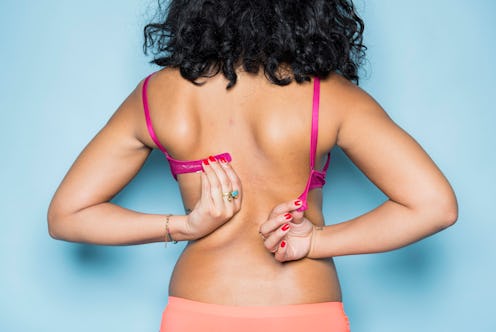Life
7 Unexpected Things That Can Happen To Your Boobs In Your 20s & 30s

You might think that your boobs were done changing once you finally made it through puberty, but it turns out, our breasts are constantly going through a set of new changes as we age. There are a number of unexpected breast changes as you get older that can happen in your 20s or 30s, and although you may not be so thrilled about these changes, you can rest assured knowing they're perfectly normal. Everyone's body is different, so some of these changes may never happen to you, but it's useful to be aware of how our hormones and lifestyle can play a role in what happens to our breasts.
"As women age, what makes up your breasts changes," plastic surgeon Anthony Youn, M.D., F.A.C.S. tells Bustle. Glandular tissue that makes up the breasts may change, which can cause boobs to change shape, says Youn. Pregnancy and breastfeeding can also cause your boobs to change.
It's important to note that there are abnormal signs in your boobs such as lumps, nipple discharge, and significant pain that can indicate breast cancer, so if you experience any of these symptoms, please see your doctor to get checked out. Otherwise, here are seven unexpected things that can happen to your boobs in your 20s and 30s that are considered perfectly common and nothing to worry about.
1Your Areolae & Nipples Can Get Larger
After pregnancy and breastfeeding, your areolae and nipples can get wider. "Women find that their entire breasts get bigger, and although the breasts will decrease in size once breastfeeding is over, the nipples and areolae often don't," says Youn.
2Your Areolae Can Get Bumpier
Pregnancy can trigger many different changes in your boobs. "Many women notice small bumps on their areolae as they get older, especially during and after pregnancy," says Youn. "These little bumps are called Montgomery glands and create oily secretions to keep the nipple and areolae moist. They typically aren't anything to worry about."
3Your Breasts Can Get Softer
The breasts gradually change in composition — which can also start to happen after women have children. "With this change comes a softer ... breast," says Youn. And though the shape and feeling of your breast might be different than it was previously, this is nothing to be ashamed of — it's a perfectly common process all women encounter, most often after pregnancy.
4You Might Notice Sun Damage On Your Boobs
Your boobs are not immune to the same UV damage the rest of your skin receives. "The [boobs] receive among the most sun damage, because many people do not apply sunscreen to this area, but leave it exposed," plastic surgeon Dr. Joshua D. Zuckerman, MD, FACS tells Bustle. "Age spots or freckles may begin to develop. Some women begin to develop vertical lines ... between the breasts at this age or begin to wake up in the morning with lines that may disappear over the course of the day." So remember to put sunscreen everywhere, including your boobs.
5You Can Get Hair Around The Nipples
Nipples beginning to grow hair is also common during your 20s or 30s. "You may experience increasing growth of hair, or coarser, darker hair, around the nipples," says Zuckerman. "This is due to changes in hormonal regulation and may be true especially for those with PCOS."
6Your Breasts Look Different From Each Other
After breastfeeding, it's quite common for boobs to look different from each other than they started. "For some reason, I find that most of my patients have a larger ... breast on the left," says Youn. "It's also usually the side that babies tend to breastfeed more. Is there a correlation? I don't know of any studies that support this, but I see it all the time in my practice."
7Your Breasts May Feel More Tender
Breast tenderness can increase with age, especially in women who consume caffeine or smoke. "Caffeine and nicotine stimulate the breast tissue, making breasts more sensitive and painful, especially days leading up to a period," Sherry Ross, MD, OB/GYN tells Bustle. "Limiting, or better yet, stopping cigarette smoking and caffeine drinking will quickly reduce your symptoms of breast pain."
Our bodies change as we age, so it's no surprise our boobs do too. We can't always control these changes, but luckily, they're completely common, and no cause to worry.